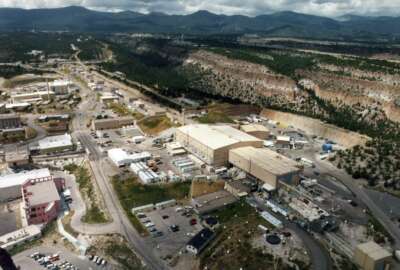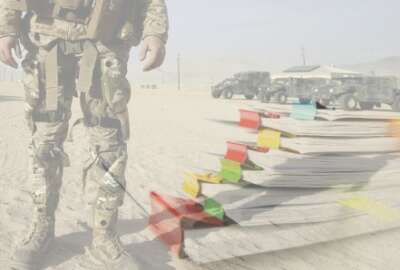Nonprofit connecting Defense and industry marks 25 years, new leadership
Retired Marine Corps Lt. Gen. Mark Faulkner, new president of the Institute for Defense and Business, joined Federal Drive with Tom Temin for more discussion.
Best listening experience is on Chrome, Firefox or Safari. Subscribe to Federal Drive’s daily audio interviews on Apple Podcasts or PodcastOne.
The Institute for Defense and Business, a nonprofit that designs educational programs for federal civilian and military agencies, has someone new at the top. Retired Marine Corps Lt. Gen. Mark Faulkner has joined as president. He joined the Federal Drive with Tom Temin for more.
Interview transcript:
Tom Temin: General Faulkner, good to have you on.
Lt. Gen. Mark Faulkner: Tom, thanks for giving me this opportunity.
Tom Temin: Tell us about the institute first. It’s a nonprofit. And what does it train people in and who does it train them?
Lt. Gen. Mark Faulkner: Let me just give you a little bit of quick history. Founded in the 90s by Bill Powell, and he worked for the state of North Carolina developing a big multimodal industrial park here in North Carolina. And as part of his efforts, he worked closely with private industry, and with the US military, on log practices and things such as that. And during the effort, a common theme emerged in meeting with all the stakeholders is each of them were very interested in each other, defense was very interested in private industry and vice versa. So, Bill Powell being a entrepreneur said, look, this is a great opportunity to provide real value. And he put together in an academic environment and developed the concept and developed the institute. And we’ve been doing that now for, matter of fact, we just celebrated our 25 year anniversary.
Tom Temin: Got it. And just give us an example of the type of program say it would deliver to a federal agency.
Lt. Gen. Mark Faulkner: We’re multifaceted but primarily focused on building tailor made education programs. And we’re very small, we’re very agile, and we’re versatile, and we have great linkages into the Defense Department, as well as private industry. And so with a little bit of a logistics underpinning theme of all our programs focused at different levels, general flag officers and members of the senior executive service, we can drop down to GS13s to 15s, majors, lieutenant colonels, focusing on key topic areas, such as cyber, cybersecurity, information operations. Technology is a theme that’s woven through a lot of them. And one of our more popular course offerings, we have about eight to 10 of them now, Tom, right now deals with depots and arsenals and the industrial base, which with all the challenges going on globally with supply chain, it’s a very popular course offering.
Tom Temin: Interesting. So you bring a logistics flavor almost to things like information operations and technology. And those are often maybe looked at in terms of pure software and software deployment. But in many ways, there is operative as a factory, I guess you might say.
Lt. Gen. Mark Faulkner: Yeah, that’s exactly right. And it being in this location and Chapel Hill is facilitates us leveraging all this experience here through whether it’s UNC to NC State. And we have very talented facilitators that really bring these leaders together in shoulder to shoulder exchanges, in an academic environment that allows them to exchange information network. It also teaches them how to think in their own professional development, ways to think strategically which I would argue, obviously, with the real world national security challenges, whether it China, North Korea and Iran, it’s never been more important that our senior leaders understand how to think strategically.
Tom Temin: We’re speaking with retired Marine Corps Lieutenant General Mark Faulkner, who is newly president of the Institute for Defense and Business. And do the courses that the government signs up for, these are on location, is it kind of a campus retreat type of thing? Or how does it work logistically?
Lt. Gen. Mark Faulkner: Yeah, Tom, thanks. Yes and yes, especially in light of COVID. Pre-COVID, it was all in residence, so it was all here. COVID, getting back to our agility, we quickly pivoted to offering them online interactive, and it worked very well. And the Defense Department and industry leverage that very quickly. So now, frankly, we have a little bit of a hybrid. And I think that that’s really going to be a little model for the future is that we have courses that we’re able to actually do an interactive online mode, and then come together perhaps for the end resident component, and I think that’s going to be a model for the future.
Tom Temin: Although there’s something lost because of the educational type programs I’ve been in residence at over the years or witnessed, there’s always big bowls of chocolates in the hallways and so forth and you don’t have that virtually, some of the little luxuries.
Lt. Gen. Mark Faulkner: No, you can’t create that chocolate virtually you can talk about it all you want to but until you actually taste it, you’re right you can’t do it. But with artificial intelligence these days, perhaps there’s a technological solution in the offing that one of our participants might come up with, who knows.
Tom Temin: You never know. But talk more about the logistics angle or aspect of say something like information operations or technology development. I mean, it’s easy to see how it maps to depots and arsenals, which are many ways are very factory like. But what about information operations?
Lt. Gen. Mark Faulkner: Yeah, growing up as a logistician, I would offer logistics is woven into all the instruments of national power, and then all the principles of war as well, whether it’s Information operations, cyber, etc. So we weave that in there, it’s more than just supply chain. It’s adaptive manufacturing. It’s technology associated with information operations. And so even though that kind of underpins it, what we’re seeing more and more is, we want to make sure that, in fact, we’re able to pivot, and I used that term earlier, but to support DoD’s requirements. And we’ve been able to do that, let me give you a couple of examples where we’ve been very pleased with working closely with the Army. The Army is really doing a tremendous job focusing on the professional development of their majors, their GS12s, 13s, 14s, and more of an operational focus. We’re able to look at specific regions now, regions in through almost like a geographic combatant commander lens, whether it’s the INDOPACOM region, or whether it’s the EUCOM region, to help scratch some of those issues. So even though logistics is our underpinning, and as I talked about earlier, what we did early on with global transport, we’re able to focus on other areas as well, Tom.
Tom Temin: I guess, in any complex project a big important way of getting it done is to marshal the resources at the right time. And so even if the resources are not hardware assets, nevertheless, you have to marshal them. And that’s logistics in a sense, correct?
Lt. Gen. Mark Faulkner: You’re exactly right. And one of the other factors that makes us unique among professional development institutions like this, nonprofits, is we’re able to leverage recently retired general flag officers and members of the senior executive service as part of an executive fellows program. So for example, we talked before we came on about the importance of mentors. This year, we have executive fellows, we have the former US TRANSCOM, Commander General McDew from the Air Force, we have Admiral Chad Allen, who’s a former Commandant of the Coast Guard, Lieutenant General Darryl Williams from the Army who just gave up the Defense Logistics Agency, and another senior executive service. So these recently retired senior leaders across the services are able to come back into a setting and actually act as mentors, answer questions, and share their experiences with the class participants.
Tom Temin: That idea of mentor ship is really important to career development, you must have had a mentor at some point that sticks out in your mind.
Lt. Gen. Mark Faulkner: I really did, thanks for asking. Major General Cliff Stanley is his name. I was a brand new lieutenant when he was a major and we stay in touch to this day. And frankly, a lot of these executive fellows stay in touch with these students when they come through. And so the networking, the social engagement, the environment that our institute provides, cannot be reinvented. I mean, it’s it really is unique.
Tom Temin: Well, you have to give the Army credit for concentrating on majors, because maybe they remember institutionally that at the outbreak of World War Two, General Eisenhower was, in fact a major.
Lt. Gen. Mark Faulkner: That’s a great point. And the Army and the Air Force are really stepping out on this. And I say that even my own service, we have some catching up to do. The last two weeks I’ve been in DC, not that I enjoy going back to DC, but it is what it is. But the point is I was I was at a couple of associations, both AUSA and NDTA, National Defense Transportation. I got to listen to both Secretary of the Army, Christine Wormuth, who’s amazing, as well as Secretary of the Air Force Kendall. And their theme, among other things, of course, was China, but they talked about people. And of course, that’s one of the Secretary Austin’s three priorities is people and talent management. But I’ll tell you, we say that a lot in the Defense Department because it resonates. But in fact, historically, that’s where we take the most risk, and we can’t get away with that anymore. And that’s one of the reasons why I thought this job was very important is that we need to actually put our money where our mouth is, and start working harder on the talent management and the social development of our leaders.
Tom Temin: Retired Marine Corps Lieutenant General Mark Faulkner is president of the Institute for Defense and Business. Thanks so much for joining me.
Lt. Gen. Mark Faulkner: Thank you. Thanks for the opportunity.
Copyright © 2025 Federal News Network. All rights reserved. This website is not intended for users located within the European Economic Area.
Tom Temin is host of the Federal Drive and has been providing insight on federal technology and management issues for more than 30 years.
Follow @tteminWFED







